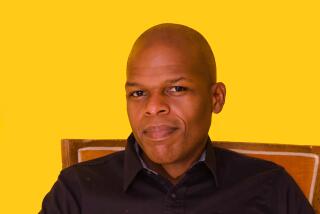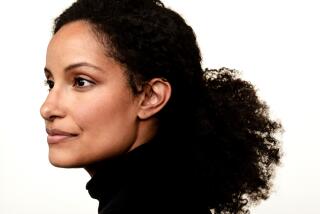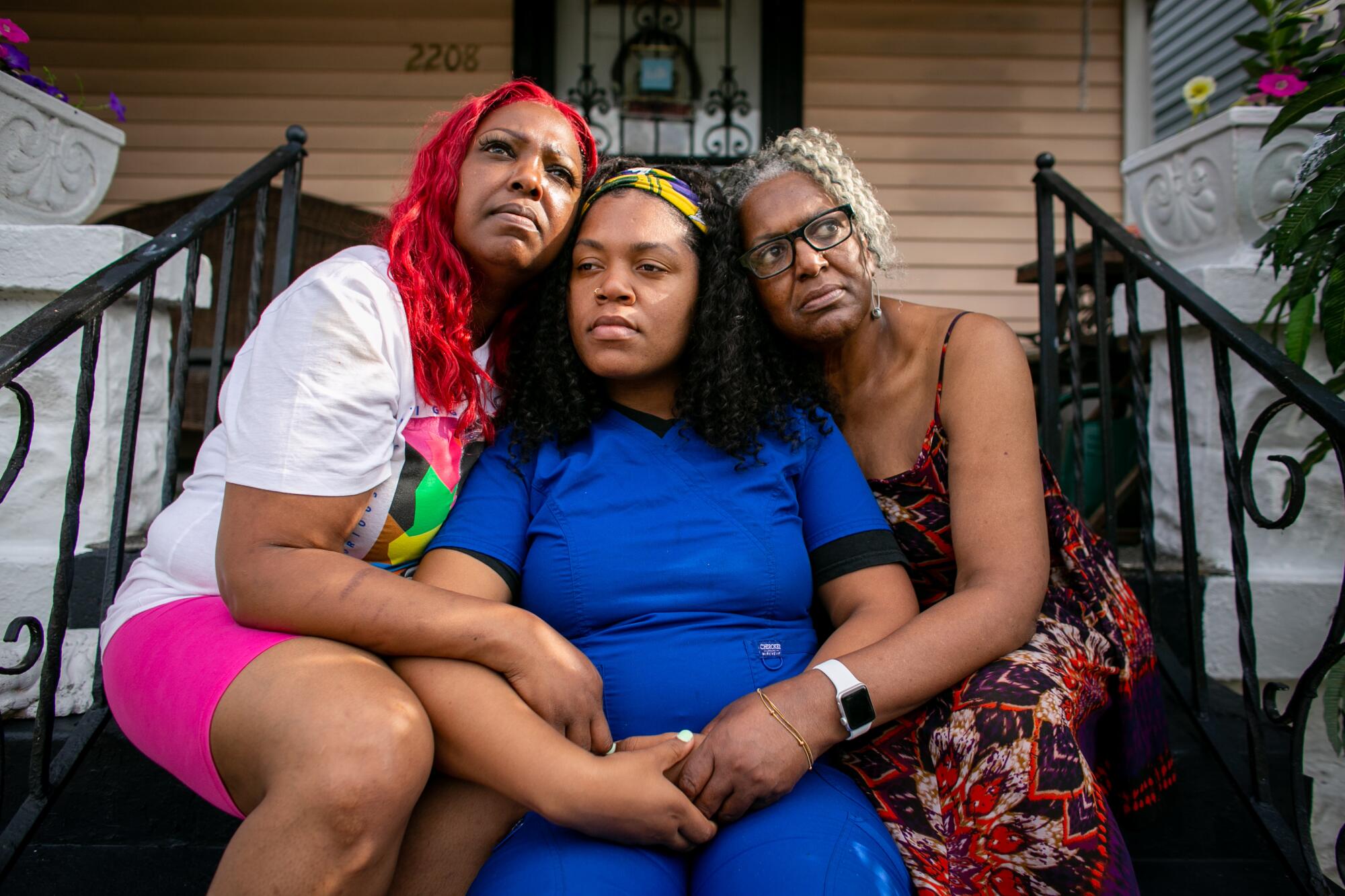
At the red-brick high school Mattie Little attended in the 1960s, the idea that a Black girl like herself could go to college never crossed her mind. She hoped to become a typist, but teachers in her rural Kentucky town urged her to set aside that dream and focus on getting work as a maid.
“Those were the rules,” she recalled. “And that was how it was going to be.”
Mattie would prove those teachers wrong and decades later beam with pride as she watched her granddaughter, NaKayla Little, walk across the stage at the University of Louisville to receive her bachelor’s degree, becoming the first in the Little family to graduate from college.
It’s a classic American story, one generation building on the work of another. But progress isn’t always linear and neat. That’s certainly true of the paths followed by Mattie and her daughter, Myya, who is the mother of NaKayla.
The story of the Little family women — Mattie, Myya and NaKayla — is one of perseverance, of pushing a bit further than the previous generation and yet still starting from behind.
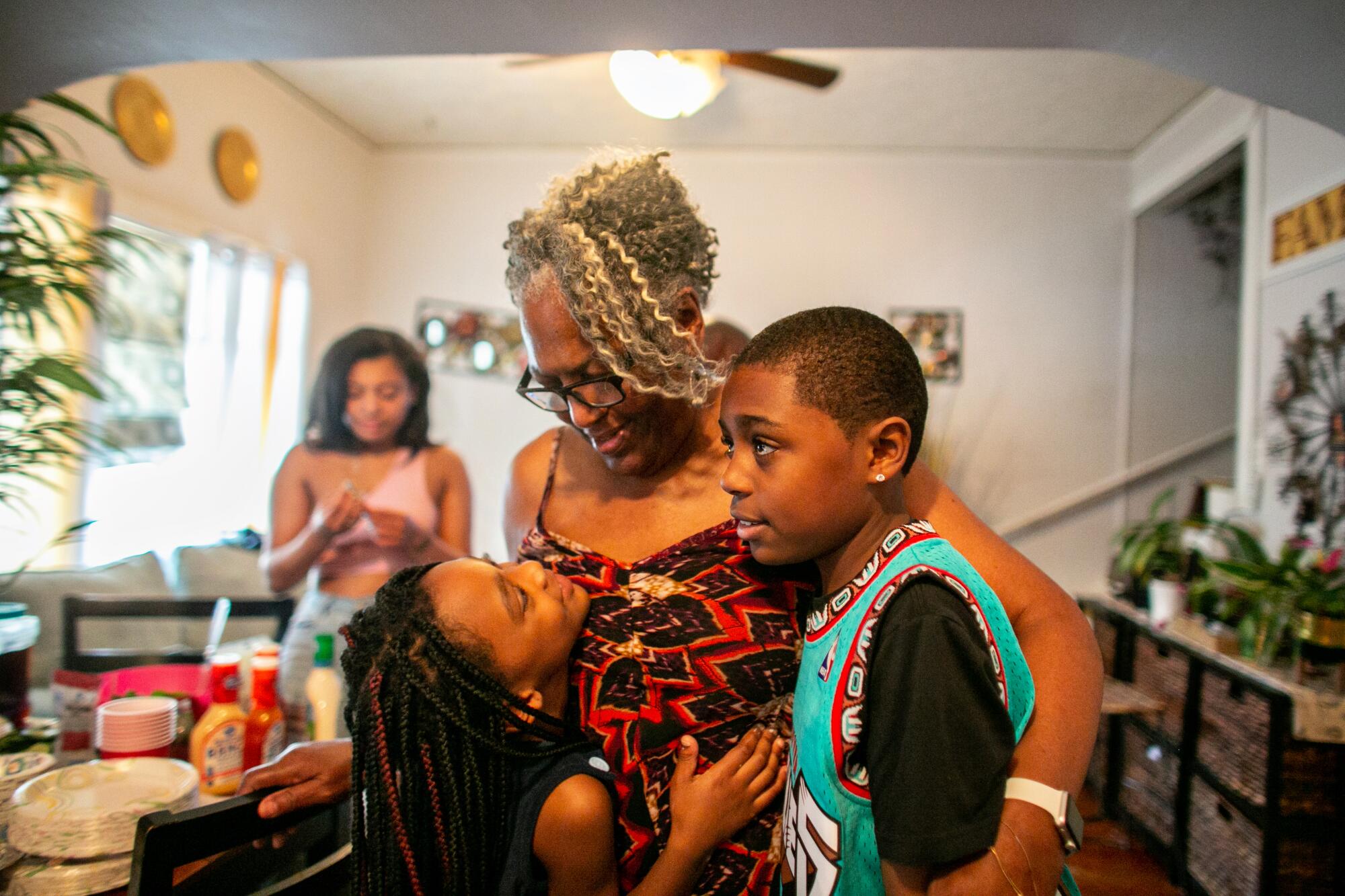
For each, there was no trust fund or inheritance, but a lineage of wisdom and love from Black women striving for better lives and leaning on one another to get there. That too is a classic American story.
::
In 1965, Mattie was an 18-year-old high school senior in Lebanon, a town 70 miles southeast of Louisville, known for Club Cherry, a stop on the famous Chitlin’ Circuit, a network of theaters and clubs where Black musicians could perform safely.
She would walk to the club with some of her siblings — more than a dozen brothers and sisters — and from the outside hear the smooth sounds of saxophones and a piano fill the air.
Her mother worked as a cook and her father at a hardware store.
This was the year the Voting Rights Act, which banned racial discrimination in voting practices, became law. Still, Jim Crow was inescapable. She knew which restaurants wouldn’t serve her, which shops she wasn’t welcome to buy a pack of her favorite bubble gum.
“It was how it was,” recalled Mattie, 73. “My mom could work in the restaurant, but her own family couldn’t even sit down and eat inside it.”
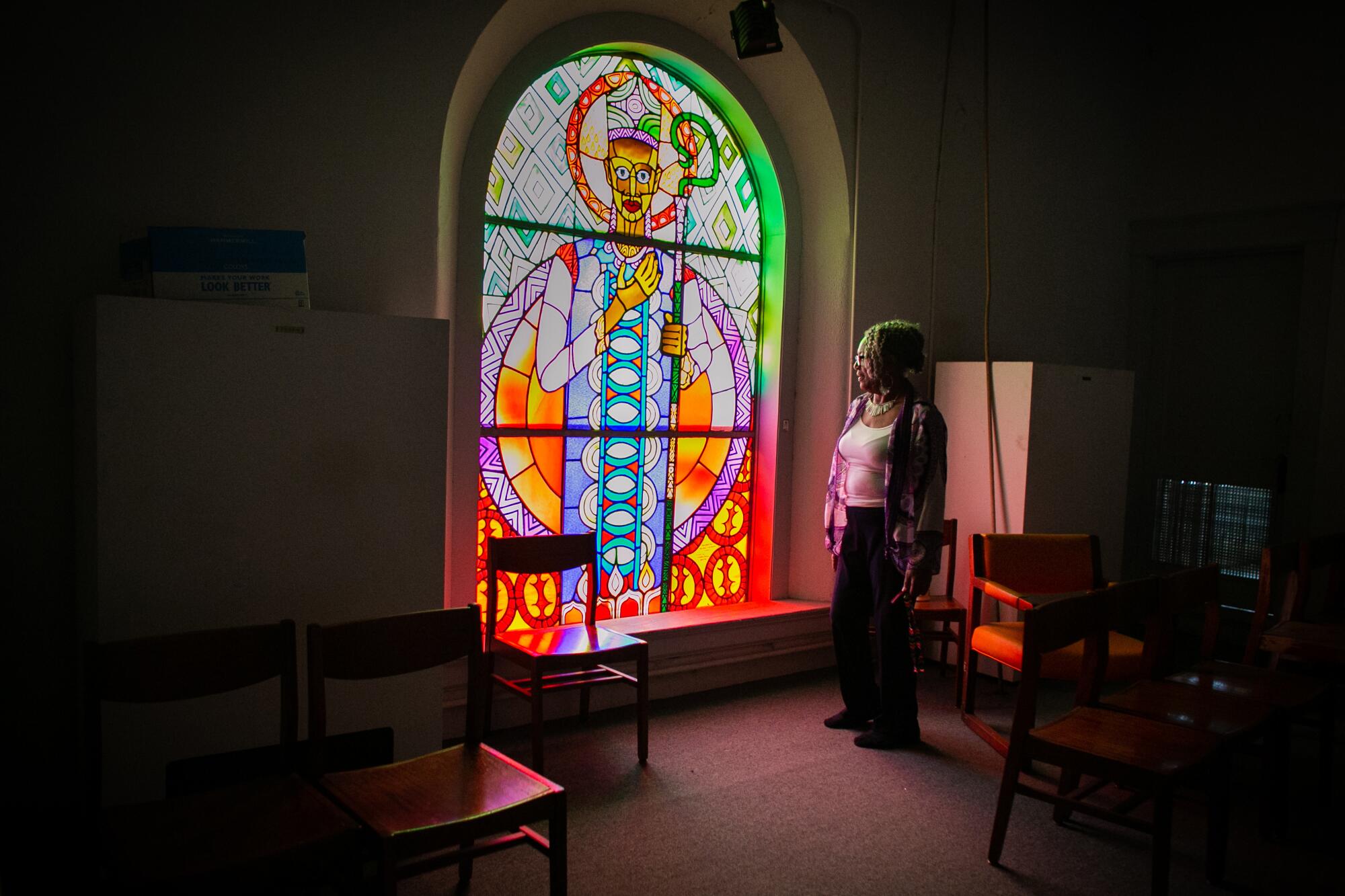
Her high school had integrated years before, but Mattie remembers most of her classmates being white. “And the teachers, who were also white, no doubt gave them the most attention,” she said.
During her freshman year, none of Mattie’s classmates looked like her, and she remembers wanting to ask questions but stifling them out of fear they would tease her.
“I failed that geometry class,” she said.
But the following semester she transferred to a different geometry class, one with a handful of Black classmates, whose engagement with the coursework gave her confidence. This time, she earned an A, and continued to thrive throughout high school. Still, college felt like a faraway island, nearly impossible to reach.
When the principal, a white man in his 40s, asked seniors what they planned to do after graduation, Mattie replied that she wanted to take typing classes to land a clerical job.
“That wasn’t going to be needed,” she remembered him saying, “because most of you would do domestic work.”
The reply still stings. “He thought I’d spend my life cleaning houses.”
After graduation, Mattie moved to Louisville, where she had an older sister. “It was the big city to us back then,” Mattie recalled with a laugh.
She found a job at the VA Medical Center, delivering dinner trays to patients’ rooms, and married her boyfriend, Jarvis Little, who had just gotten out of the Army.
In 1969, she left the VA and entered a six-month typing class funded by the Urban League. She soon got a job as a secretary at a furniture store, where she worked for a few years, before becoming a data processor at a company that would eventually become BellSouth.
The woman who had been told she would be cleaning houses was now working for a major telecommunications firm. Mattie remembers the relief of getting a job in which, in 1970, she earned about $67 a week. The job, which would later become unionized, funded courses at Spalding University, and Mattie took classes here and there but never finished as she started a family of her own.
She had a son and then, in 1976, she had Myya.
“There was so much joy in also having a girl,” she recalled.
As the family grew and money stretched increasingly thin, Mattie began applying for positions with more responsibility within the company, but the promotions almost always went to her white colleagues, she said.
“They were for one, white, so they were at an advantage because all the bosses were white,” she said. “They also had college degrees.” She never got promoted.
Mattie preached the importance of an education to her children — college, she often told Myya, would be a ticket to a better life in America.
::
Myya grew up in the West End of Louisville, the part of town where Black families, including her own, had settled because of racist redlining practices that blanketed cities across the nation.
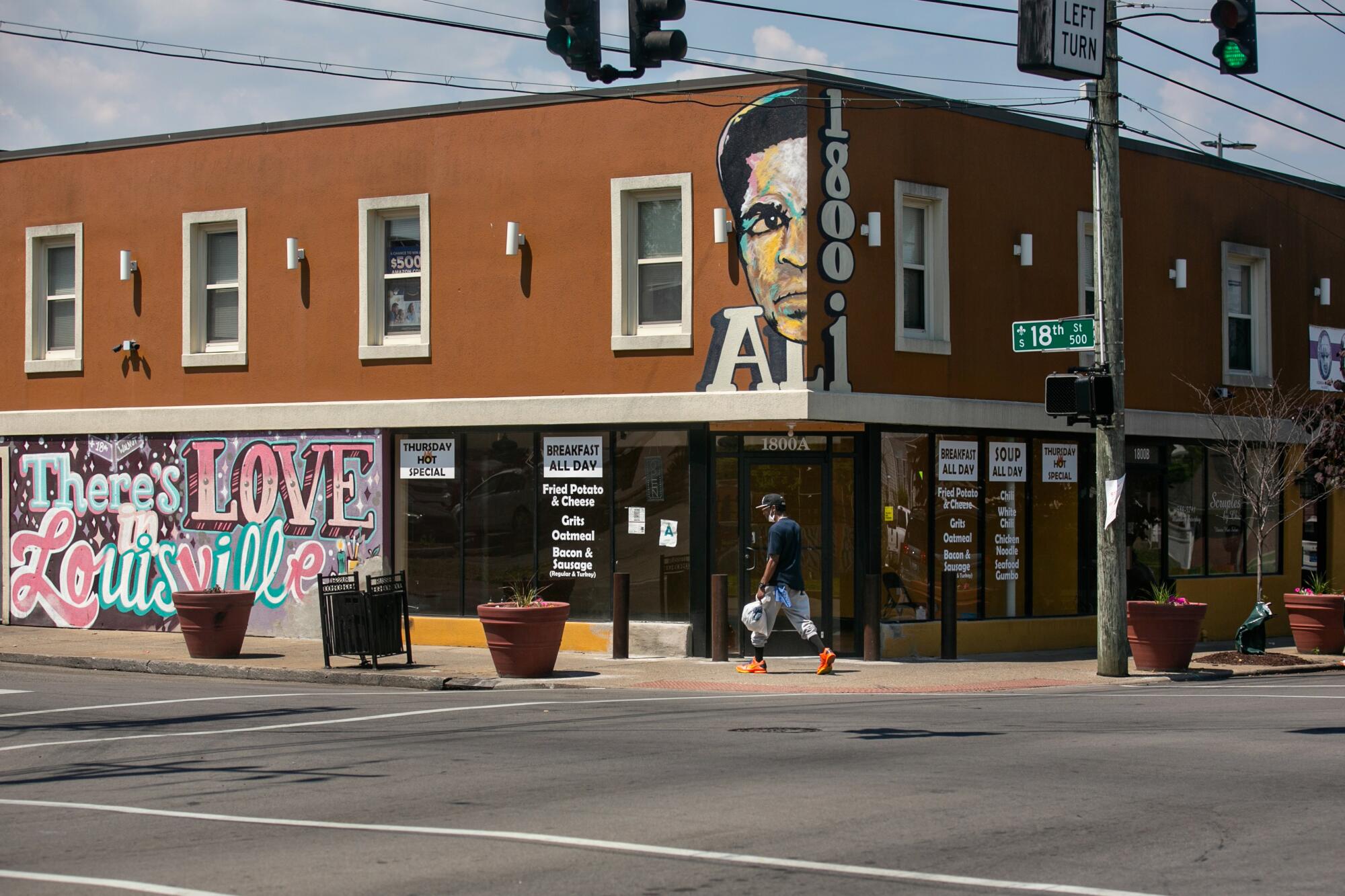
The area had high poverty rates born of decades of governmental neglect, but the neighborhood boomed with pride over its native son: Cassius Clay. When Myya was growing up, Clay, by then Muhammad Ali, was retired and regularly visited the area.
“He was one of the best things about this neighborhood,” Myya said.
When she turned 18 during her senior year, in 1994, the themes of segregation and racism made global headlines. South Africa held its first multiracial elections as apartheid ended, electing Nelson Mandela president.
Back in Louisville, the school district had, for decades, used a busing plan to desegregate classrooms, which later required at least 15% and no more than 50% Black enrollment at the district’s schools.
Her school, Ballard High, was in the East End of Louisville — the white side of town — and Myya never felt as though she truly fit in. There were a few kids from her neighborhood who were also bused to the mostly white school. She didn’t like leaving her neighborhood and quickly lost interest.
“It was just a place to hang out,” said Myya, now 45. “It’s sad to think back on it and say that, but it was.”
She said she felt as though none of the teachers cared about her success, and she began to wonder what the point was. Despite her mother’s pleas to improve her grades, she started skipping school.
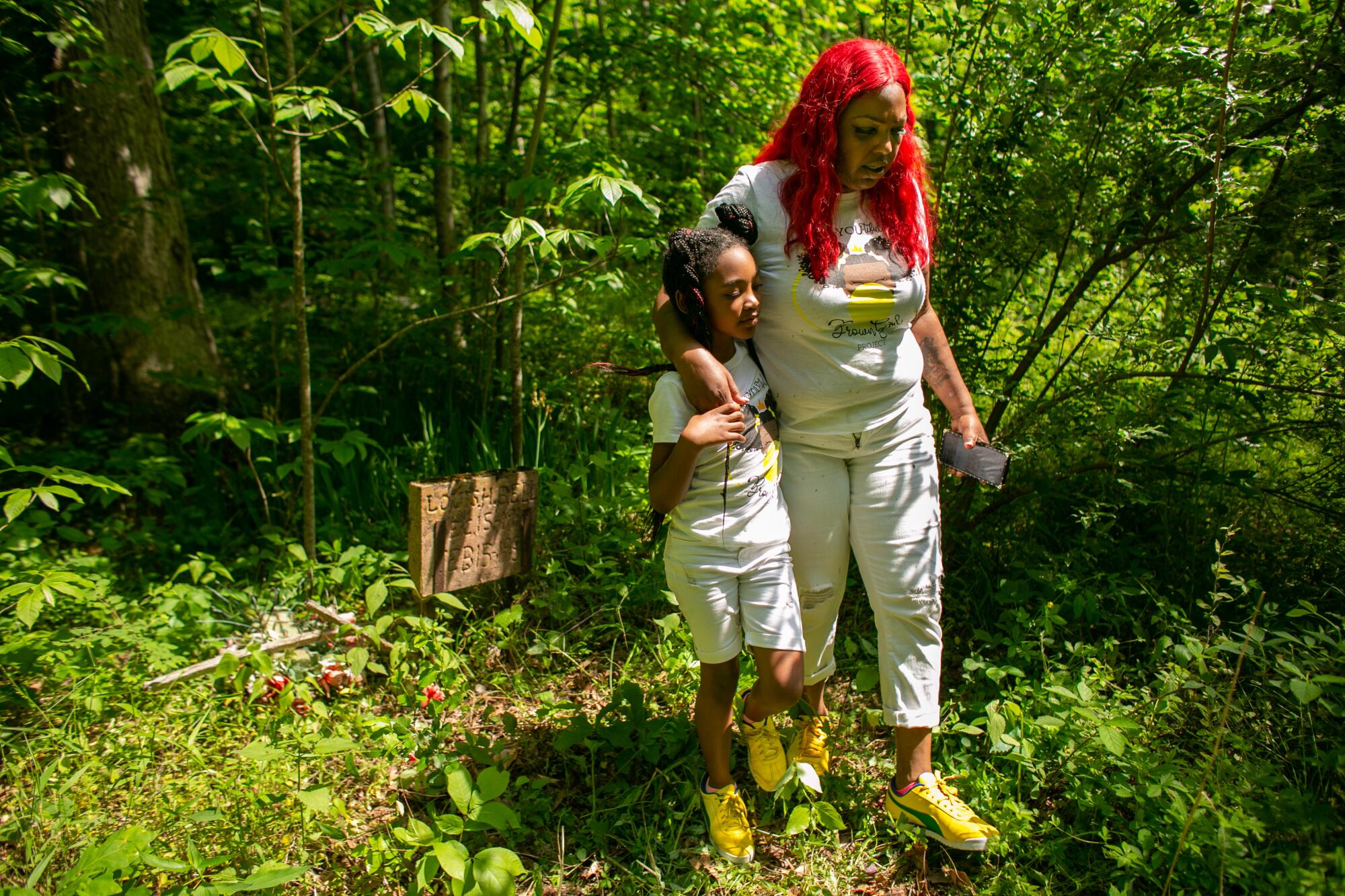
Myya thinks back on her youth and how she did not understand the long-term consequences of her decisions. It pained Mattie to see her daughter not value school — especially after all she had been through in Lebanon. But, still, she never stopped believing in Myya’s potential.
“It’s your child,” Mattie said. “You never stop loving them and wanting to see them shine.”
Myya had a boyfriend, Jamal Oliver, got pregnant and in February 1994 gave birth to NaKayla.
Four months later, she was still able to get her diploma and even won a $5,000 grant to study nursing at Spalding University.
“It was a natural fit,” she said of nursing. She’d always been gregarious and wanted to help people.
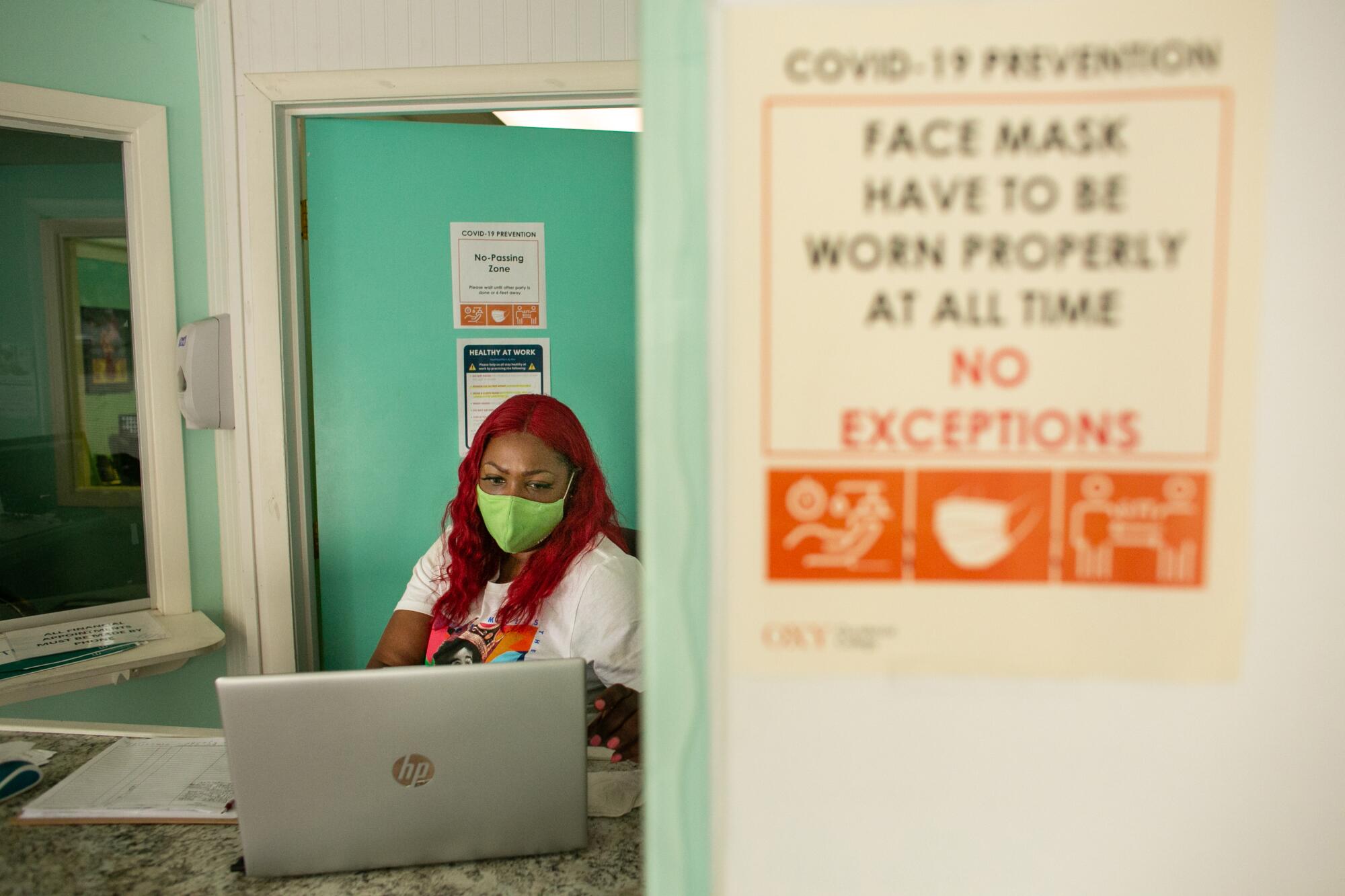
But between rent and books and meals, she couldn’t afford everything she needed for NaKayla.
“I had this new responsibility,” she said. “I was a mother, and only mothers know what love and bond feels like when they have a child.”
She dropped out and took a job as a cashier making minimum wage. She often dreamed that, perhaps, one day her daughter would fulfill the dream she’d deferred: becoming a nurse.
::
Every week, family gathered for dinner at Mattie’s house, and three generations of women laughed and cooked together. A regular favorite: baked spaghetti. They talked about their dream trips overseas — Paris, somewhere in Peru or Africa.
Mattie and Myya stressed the importance of education — a degree, they told NaKayla, was the ticket to those far-off places they dreamed about.
“School was always No. 1 for me,” said NaKayla, who went to private Catholic schools, funded by sponsors who were members of the Little family’s church.
She was among a handful of Black students, but it didn’t deter her. She got good grades and didn’t think twice about her next step.
“There was a sense of pressure, because no one in my family had graduated from college,” she said.
It was 2012 — the U.S. was bouncing back from the recession and President Obama, the nation’s first Black president, was campaigning for a second term. But with that optimism came a devastating reality in NaKayla’s neighborhood: gun violence.
NaKayla, then 18, knew several young men shot to death in her neighborhood, she said, and she wanted to move away, so she enrolled at Hampton University, a historically Black college in Virginia.
She never felt as though she fit in — some of her classmates came from privileged backgrounds — and NaKayla grew homesick, longing for those weekly meals with Mattie and Myya. Soon she returned to Louisville.
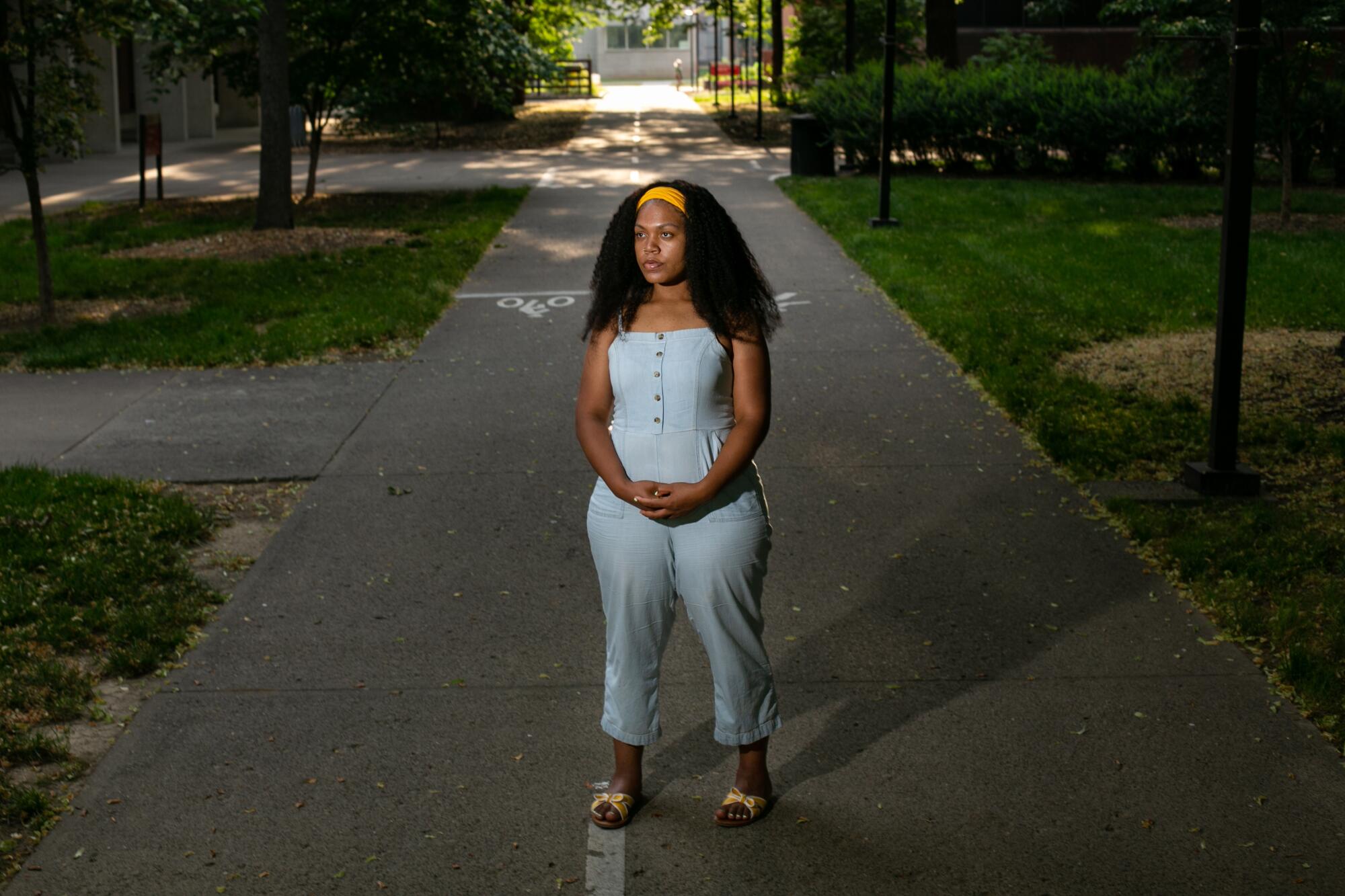
NaKayla started cosmetology school and graduated, but soon realized she wanted a career with more earning potential. A degree in something — anything — was a better option, she told herself, rejoicing when she got accepted at the University of Louisville.
She got her bachelor’s degree in communications in 2016, but then came to another realization: She struggled to find a job that was rewarding.
She thought about moving far from home to try out life in Seattle, where she found there were plenty of opportunities in the communications field.
NaKayla knew a little about Myya’s dreams of becoming a nurse but had never given it much thought as a career option for herself.
She prayed on it.
Then, nearly 25 years after her mother enrolled as a nursing student at Spalding, NaKayla followed in Myya’s footsteps, quickly discovering she shared her mother’s love for the profession. She graduated from nursing school in 2019.
For most of the COVID-19 pandemic, she has been too consumed by the job to think much about her student loans — about $65,000 — which she hopes she can pay off within a decade. The long hours inside intensive care units and concerns about getting the coronavirus have consumed her.
“The work has kept me busy,” she said. “I need to work and stay healthy.”
::
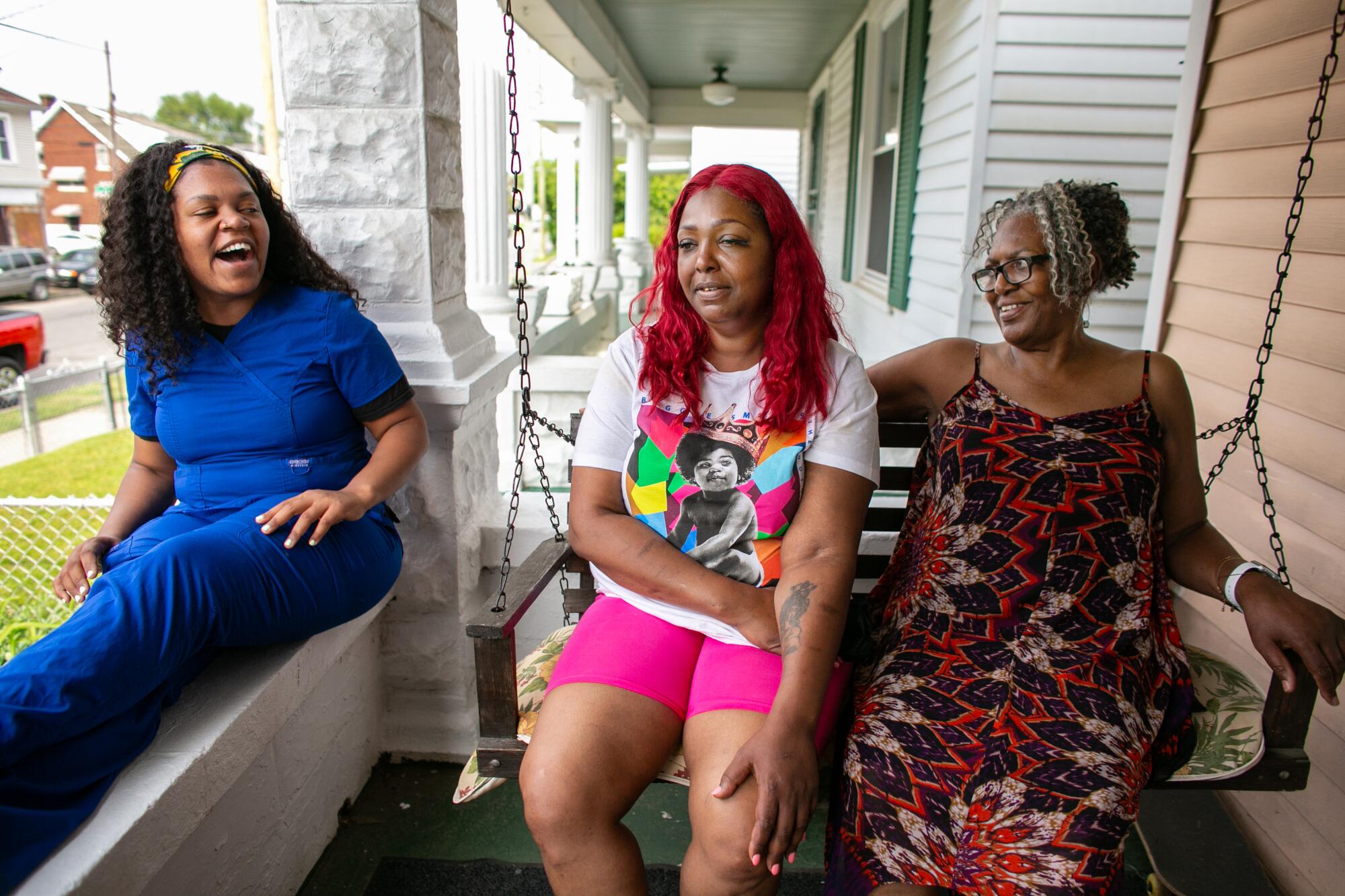
On a muggy evening a few months ago, Myya and NaKayla sat on the porch of Mattie’s house in Louisville, the home where both women were basically raised. A helicopter buzzed across the sky and the hum of cicadas echoed off the neighbors’ houses.
“There’s going to be a lot of joy this year,” Mattie said, now that “we have a new little one on the way.”
NaKayla smiled, resting her hand on her growing belly. She and her boyfriend, Lealand Robinson, were expecting their first child.
NaKayla and Myya had also started to think about opening their own business — something for both women to do on the side. A family friend has a food truck and NaKayla recently looked up the price: $1,200.
Myya had cooked plates of food — fried fish, baked potatoes, rice — and sold them during the early months of the pandemic, when she was between jobs and needed to make money. Myya was inspired by NaKayla to think about working for herself. They want the truck to specialize in some of the vegan recipes Myya has been testing.
“We can work for ourselves. Now wouldn’t that be nice?” Myya said.
“It’s what we’ve always wanted,” NaKayla said with a nod.
Being your own boss. It’s another classic American goal.
But, bit by bit, the three Little family women have achieved fundamental goals. It’s a story that’s played out time and again across this country.
Mattie overcame bigotry and exceeded expectations to create a home for her daughter. Myya set aside her dream to raise her daughter and helped NaKayla discover her passion. Now, NaKayla is inspiring Myya.
Mattie, the matriarch, smiled at her daughter and granddaughter as a bright sun slipped under the horizon.
NaKayla smiled back, continuing to rest her hand on her belly.
She and Lealand had recently picked out a name for their child: a daughter, Amelia Eleanor Rose. She was born Oct. 20.
More to Read
Start your day right
Sign up for Essential California for news, features and recommendations from the L.A. Times and beyond in your inbox six days a week.
You may occasionally receive promotional content from the Los Angeles Times.
